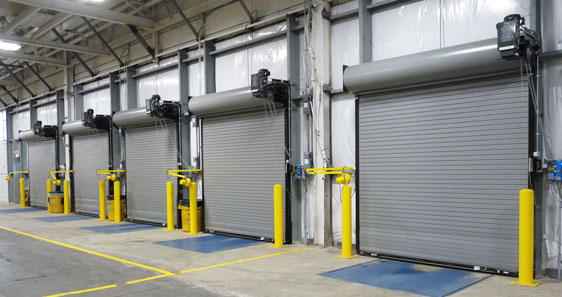Commercial Door Maintenance Checklist: Rolling / Coiling Steel Doors
Posted Tuesday, February 21st, 2017

Preventative maintenance is a vital step in assuring your commercial doors are safe and last for as long as possible. We recommend following a checklist. We also advise having your doors evaluated at least one time per year by a trained and certified technician.
Below are some maintenance specifics for rolling doors.
Recommended Preventative Maintenance Schedule for Rolling/Coiling Steel Doors
Preventative maintenance on rolling/coiling steel doors varies depending upon the operating conditions. How often it should be maintained depends upon the following:
Environmental Conditions
- Is the door in a corrosive environment?
- Is the door located by saltwater?
- Is the door in a wash down room?
- Is there a lot of dust getting into and on the door?
Usage Parameters
- Is the door the primary entry and exit into the building?
- Is the door part of the loading dock area and exposed to high forklift traffic and potential damage?
- Is the door the primary entry and exit into the service area and being used for vehicles and pedestrians?
Recommendations
Daily inspections
- Visually look at how the door sits in the opening. Can you see light coming under one side more than the other?
- Look at the door curtain. Can you see daylight between the slats and the vertical guides?
- Watch the door as it opens and closes.
- Is it binding in the tracks?
- Does the motor run awhile before the door moves?
- Does the door bag up when it hits the floor? Does it slam into the door stops when it reaches the header?
- Look at the vertical guides that the door travels in.
- Are they hit or damaged?
- Are there missing bolts?
- Is the bottom weather seal intact and making proper contact with the floor?
- Is the side weather seal intact and making contact with the curtain?
- Can you see metal shavings at the base of the guides?
- Do you hear any clunking sounds from the gears or inside the coil as the door opens and closes?
- Is the hood damaged and dented?
- Are the door stops properly hitting the bottom bar or does the door travel past?
If the door is motor operated:
- Check the open, stop, and close button to make sure all are working.
- Check the reverse edge on the bottom of the door to make sure the door reverses when it is closing.
- Check the photo eyes to make sure the door reverses when closing.
- If a loupe is cut into the ground surface, check to make sure it’s opening the door when a vehicle is positioned over it.
- Check the timer to insure proper open or close time after vehicle leaves.
Be Advised:
- If you answered yes to any of the above issues, your door should be checked by a trained door technician immediately.
- If any of the safety equipment is not working, your door should be taken out of service until the problem is resolved.
- Yearly or semi-annual preventive maintenance should only be performed by trained door technicians.
- Excessive grease and lubrication will actually hamper the door function unless properly applied to where it needs to be.
Warnings:
- Do not continue to operate a door that has been damaged.
- Do not continue to operate a door that is difficult to completely open or close.
- Do not use an electric operator to “power open or close” a poorly operating or damaged door.
- Do not attempt to wind, or unwind, or otherwise tamper with a spring counterbalance system.
- Only qualified persons should ever attempt adjustment of the counterbalance spring assembly on any door.
- Only qualified door technicians should ever work on the motor operators or safety equipment attached.
If you are still unsure about whether or not your door ought to be serviced, give our team a call. We would be happy to advise you. Commercial Door Maintenance Appointment